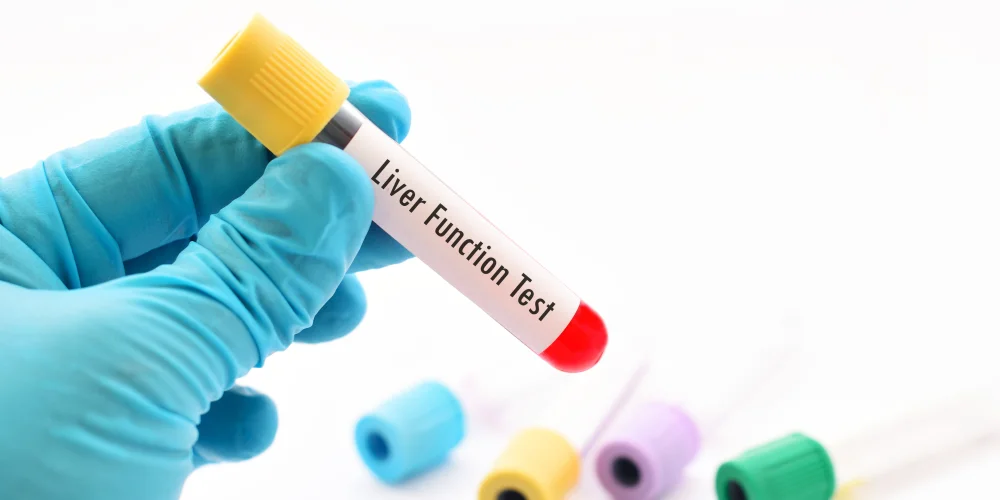Liver Function Test
Liver Function Test
The Liver Function Test (L.F.T) consists of a battery of blood tests used to assess liver health and functionality. This comprehensive diagnostic tool measures enzymes, proteins, and other substances produced or processed through liver as a part of its daily processes – providing insight into its condition as a means to maintain good health.

When are LFT tests typically prescribed?
The Liver Function Test (LFT) is an indispensable diagnostic tool used in various clinical scenarios to assess and monitor liver health. First and foremost, liver biopsies serve multiple essential purposes; firstly in detecting liver diseases like hepatitis, cirrhosis and fatty liver disease by measuring liver enzymes and proteins. Second, liver function testing plays a crucial role in monitoring ongoing liver health among patients with known or suspected liver conditions or who are currently receiving treatments that could compromise liver health. LFT tests also help healthcare providers assess the effects of medications or toxins on liver function, helping ensure treatments don’t compromise liver health. Finally, LFT serves as an integral part of general health screenings, enabling evaluation of liver health even among asymptomatic individuals – thus providing early detection and intervention of any liver abnormalities.
Preparing for the L.F.T Test
No special preparation is usually necessary for an L.F.T Test; patients can eat and drink normally before their appointment. It is essential to inform your healthcare provider of any medications, supplements, or recent illnesses as these factors could alter test results.
Parameters to Be Considered during L.F.T Test
The Liver Function Test (LFT) assesses several key parameters critical for assessing and monitoring liver health. Alanine Aminotransferase (ALT) and Aspartate Aminotransferase (AST), both enzymes which serve to measure damage or inflammation within liver cells, are tested as indicators. Albumin and Total Protein levels indicate how well your liver synthesizes essential proteins necessary for bodily functions, while Bilirubin levels give an indication of potential liver or bile duct issues when elevated. Alkaline Phosphatase (ALP) levels are closely tied to both bile duct and bone health, helping in diagnosing conditions affecting both liver and bones. When combined, these parameters provide a comprehensive evaluation of liver function enabling accurate diagnosis and ongoing monitoring of liver diseases effectively.
Time Required to Replicate LFT Test
The Liver Function Test (L.F.T) is an efficient procedure. Once blood samples have been taken, results typically become available within a day allowing healthcare providers to promptly assess liver function and make informed decisions regarding further treatments or diagnostic investigations should further evaluation or testing be necessary.
L.F.T Price
At Rs800, our Liver Function Test (L.F.T) ensures affordable access to essential diagnostic testing for liver health. This cost-effective solution supports early detection and effective management of liver conditions for improved patient outcomes.
Book an Appointment for HbA1c Test
Making an appointment to take your glucose test in the Chirayu SuperSpeciality Hospital is simple and quick. It is possible to schedule your test online via our easy-to-use website or contact our department. We’re committed to offering efficient, prompt service to meet your health care requirements, providing a seamless and enjoyable experience for our patients.
What Our Patients Say
Hear from our valued patients about their experiences at Chirayu Super Speciality Hospital and how our care has made a positive impact on their health and well-being.


Booking my L.F.T appointment online was easy and convenient. Excellent service overall.


The entire process was handled professionally, and I got my L.F.T results quickly.


I received my L.F.T results within a day, allowing my treatment to start immediately.


I appreciate the affordable price for the L.F.T at Chirayu, making it accessible for everyone.


The staff at Chirayu were very professional and made the L.F.T process smooth and stress-free.


I had a great experience with Chirayu's L.F.T service. The staff was friendly and efficient.
Frequently Asked Questions
Here, we provide answers to some of the most commonly asked questions to help you better understand our services, policies, and facilities. If you have any additional questions, please do not hesitate to contact us.
It helps diagnose liver diseases and assesses overall liver function.
Typically, fasting is not necessary, but inform your healthcare provider about any medications or supplements.
It provides crucial information about liver health, aiding in diagnosis, treatment, and monitoring of liver diseases.
Results are usually available within a day, allowing for timely medical decisions based on liver function assessment.